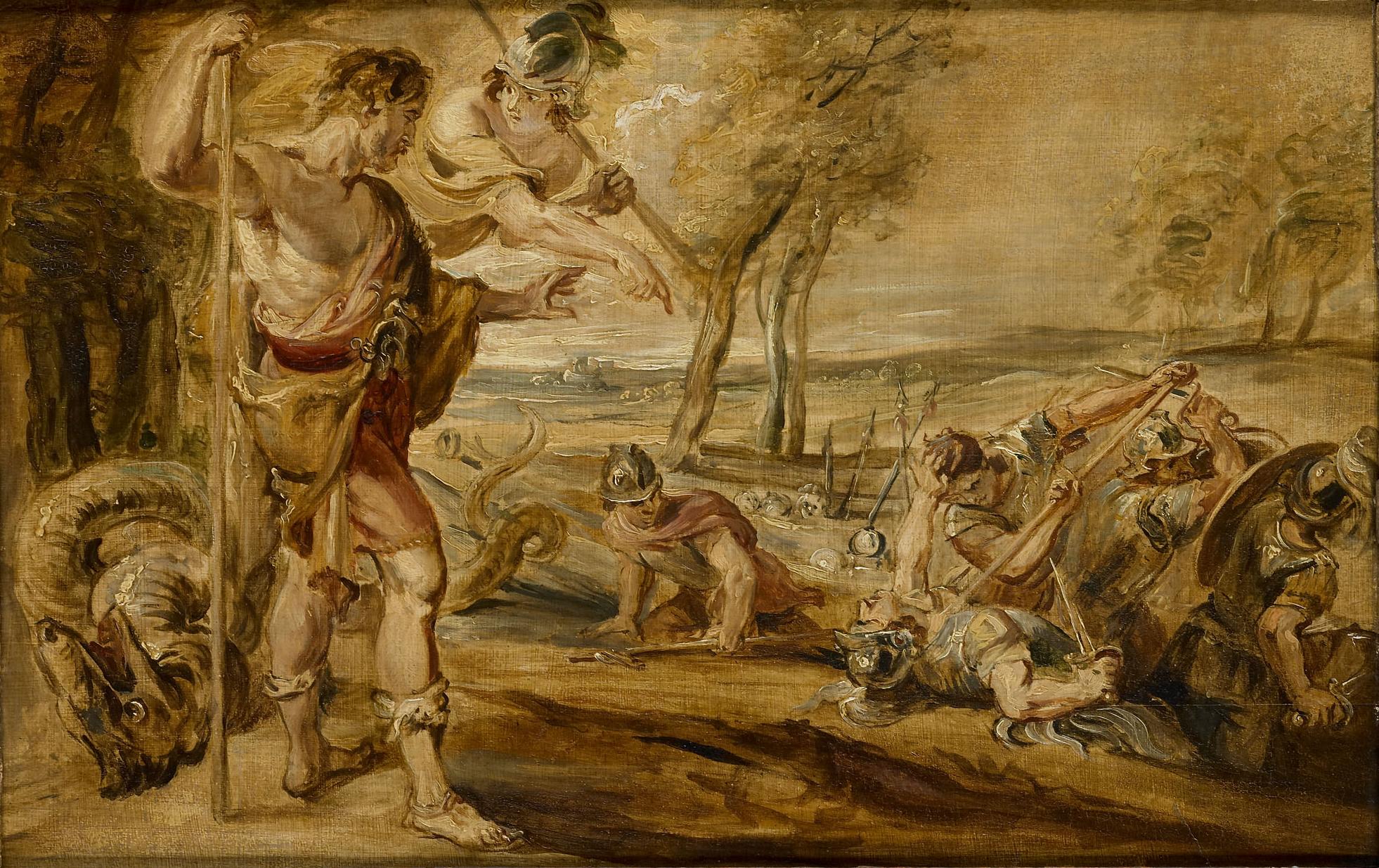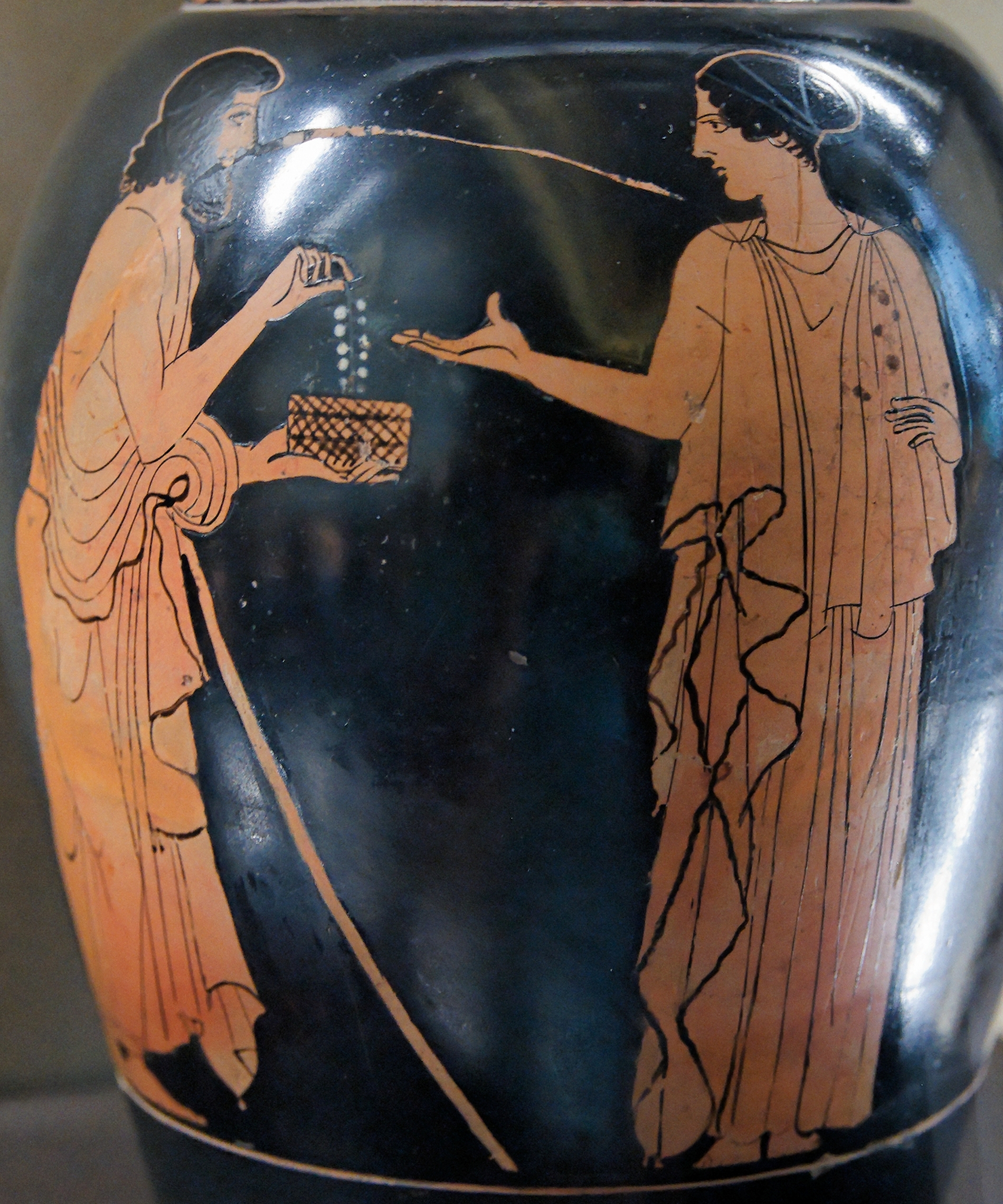|
Harmonia
In Greek mythology, Harmonia (; /Ancient Greek phonology, harmoˈnia/, "harmony", "agreement") is the goddess of harmony and concord. Her Greek opposite is Eris (mythology), Eris and her Roman mythology, Roman counterpart is Concordia (mythology), Concordia. Harmonia is most well-known for her marriage to Cadmus and the many misfortunes that haunted her descendants, particularly those related to the fabled Necklace of Harmonia. Family Harmonia's parentage varies between accounts. She has most often been named as a daughter of the gods Ares and Aphrodite.Scholia on Homer, ''Iliad'' B, 494, p. 80, 43 ed. Bekk. as cited in Hellanicus of Lesbos, Hellanicus' ''Boeotica''Apollodorus of Athens, Apollodorus3.4/ref> This would make her the sister of other mythological figures such as Aeneas, Phobos (mythology), Phobos, and Eros. In other accounts, Harmonia was born in Samothrace to Zeus and the Pleiades (Greek mythology), Pleiad Electra (Pleiad), Electra. In this telling, Harmonia woul ... [...More Info...] [...Related Items...] OR: [Wikipedia] [Google] [Baidu] |
Cadmus
In Greek mythology, Cadmus (; ) was the legendary Phoenician founder of Boeotian Thebes, Greece, Thebes. He was, alongside Perseus and Bellerophon, the greatest hero and slayer of monsters before the days of Heracles. Commonly stated to be a prince of Phoenicia, the son of king Agenor and queen Telephassa of Tyre, Lebanon, Tyre, the brother of Phoenix (son of Agenor), Phoenix, Cilix and Europa (consort of Zeus), Europa, Cadmus traced his origins back to Poseidon and Libya of Egypt, Libya. Originally, he was sent by his royal parents to seek out and escort his sister Europa back to Tyre after she was abducted from the shores of Phoenicia by Zeus. In early accounts, Cadmus and Europa were instead the children of Phoenix (son of Agenor), Phoenix.Scholia on Homer, ''Iliad'' B, 494, p. 80, 43 ed. Bekk. as cited in Hellanicus of Lesbos, Hellanicus' ''Boeotica'' Cadmus founded or refounded the Greek city of Ancient Thebes (Boeotia), Thebes, the acropolis of which was originally named ... [...More Info...] [...Related Items...] OR: [Wikipedia] [Google] [Baidu] |
Necklace Of Harmonia
The Necklace of Harmonia, also called the Necklace of Eriphyle, was a fabled object in Greek mythology that, according to legend, brought great misfortune to all of its wearers or owners, who were primarily queens and princesses of the ill-fated House of Thebes. Origins There are multiple stories concerning the creation of the necklace and origin of its curse. The most common version names Hephaestus, the god of smithing, as its creator. Hephaestus was married to Aphrodite, who regularly had sexual trysts with Ares behind her husband's back. When Hephaestus was informed of his wife's actions by Helios, he was enraged and vowed to curse any children born of the affair. Aphrodite and Ares had multiple children together, including Harmonia, goddess of harmony and concord.Apollodorus, ''Library''3.4/ref> Harmonia was betrothed to Cadmus, the legendary founder of Thebes. Upon hearing of the engagement, Hephaestus attended the wedding and gave Harmonia an exquisite necklace (ὅρμο� ... [...More Info...] [...Related Items...] OR: [Wikipedia] [Google] [Baidu] |
Electra (Pleiad)
In Greek mythology, Electra (; 'amber') was one of the Pleiades, the seven daughters of Atlas and Pleione. She lived on the island of Samothrace. She had two sons, Dardanus and Iasion (or Eetion), by Zeus. Pseudo-Scymnos, ''Circuit de la terre'' 646 ff. Electra was connected with the legend of the Palladium, the sacred statue, which became the talismanic protector of Troy. Electra, along with the rest of the Pleiades, were transformed into stars by Zeus. By some accounts she was the one star among seven of the constellation not easily seen because, since she could not bear to look upon the destruction of Troy, she hid her eyes, or turned away; or in her grief, she abandoned her sisters and became a comet. Family The Pleiades were said to be the daughters of Atlas, who was the son of the Titan Iapetos. No early source mentions their mother, but according to some late accounts she was the Oceanid Pleione. Hyginus' ''De astronomia'' says that Electra and her six sisters were ... [...More Info...] [...Related Items...] OR: [Wikipedia] [Google] [Baidu] |
Polydorus Of Thebes
In Greek mythology, Polydorus or Polydoros (; means 'many-gift d) was a king of Thebes. Family Polydorus was the youngest and only male child of Cadmus and Harmonia, his sisters were Autonoë, Ino, Agave and Semele. He was the father of Labdacus by Nycteïs, the daughter of Nycteus. Mythology Upon the death of Cadmus, Pentheus, the son of Echion and Agave, after banishing Polydorus ruled Thebes for a short time until Dionysus prompted Agave to kill Pentheus. Polydorus then succeeded Pentheus as king of Thebes and married Nycteïs. When their son Labdacus was still young, Polydorus died of unknown causes, entrusting his father-in-law Nycteus to care the infant prince and to be his regent. In Pausanias's history, Polydorus' rule began when his father abdicated the throne and together with his mother Harmonia migrated to the Illyrian tribe of the Enchelii, but this is the only source for such a timeline. It is also said that along with the thunderbolt hurled at ... [...More Info...] [...Related Items...] OR: [Wikipedia] [Google] [Baidu] |
Ares
Ares (; , ''Árēs'' ) is the List of Greek deities, Greek god of war god, war and courage. He is one of the Twelve Olympians, and the son of Zeus and Hera. The Greeks were ambivalent towards him. He embodies the physical valor necessary for success in war but can also personify sheer brutality and bloodlust, in contrast to his sister Athena, whose martial functions include military strategy and generalship. An association with Ares endows places, objects, and other deities with a savage, dangerous, or militarized quality. Although Ares' name shows his origins as Mycenaean, his reputation for savagery was thought by some to reflect his likely origins as a Thracian deity. Some cities in Greece and several in Asia Minor held annual festivals to bind and detain him as their protector. In parts of Asia Minor, he was an oracular deity. Still further away from Greece, the Scythians were said to ritually kill one in a hundred prisoners of war as an offering to their equivalent of Ar ... [...More Info...] [...Related Items...] OR: [Wikipedia] [Google] [Baidu] |
Aphrodite
Aphrodite (, ) is an Greek mythology, ancient Greek goddess associated with love, lust, beauty, pleasure, passion, procreation, and as her syncretism, syncretised Roman counterpart , desire, Sexual intercourse, sex, fertility, prosperity, and victory. Aphrodite's major symbols include seashells, Myrtle (common), myrtles, roses, doves, sparrows, and swans. The cult of Aphrodite was largely derived from that of the Ancient Canaanite religion, Phoenician goddess Astarte, a cognate of the East Semitic goddess Ishtar, whose cult was based on the Sumerian religion, Sumerian cult of Inanna. Aphrodite's main cult centers were Kythira, Cythera, Cyprus, Corinth, and Athens. Her main festival was the Aphrodisia, which was celebrated annually in midsummer. In Laconia, Aphrodite was worshipped as a warrior goddess. She was also the patron goddess of Prostitution in ancient Greece, prostitutes, an association which led early scholars to propose the concept of sacred prostitution in Greco-Rom ... [...More Info...] [...Related Items...] OR: [Wikipedia] [Google] [Baidu] |
Agave Of Thebes
In Greek mythology, Agave (; or 'high-born'), was the daughter of Cadmus and a princess of Thebes. She is most well known for her role in the myths surrounding her nephew, Dionysus, god of wine. Family Agave was the eldest daughter of Cadmus, a legendary hero, king, and founder of the city of Thebes, and of the goddess Harmonia, goddess of harmony. She had three sisters: Autonoë, Ino and Semele, and a brother, Polydorus.Apollodorus3.4.2/ref> Agave married Echion, one of the five Spartoi, and was the mother of Pentheus, a king of Thebes, and Epirus. Mythology In Euripides' play '' The Bacchae'', Semele, while pregnant with Dionysus, was tricked by Hera into witnessing the true form of Zeus, and was destroyed by the sight. Agave, Ino, and Autonoë began to spread a rumor that Semele had only been pretending that Zeus was the father of her child in order to conceal the fact that she was pregnant out of wedlock with the child of a mortal man, and that her death was a puni ... [...More Info...] [...Related Items...] OR: [Wikipedia] [Google] [Baidu] |
Ino (Greek Mythology)
In Greek mythology, Ino ( ; ) was a Theban princess who later became a queen of Boeotia. After her death and transfiguration, she was worshiped as a goddess under her epithet Leucothea, the "white goddess." Alcman called her "Queen of the Sea" ( ''thalassomédousa''), which, if not hyperbole, would make her a goddess parallel to Amphitrite. Family Ino was the second daughter of the King Cadmus and Queen Harmonia of Thebes and one of the three sisters of Semele, the mortal woman of the house of Cadmus who gave birth to Dionysus. Her only brother was Polydorus, another ruler of Thebes. Together with her two sisters, Agave and Autonoë, they were the surrogates and divine nurses of Dionysus: : Ino was a primordial Dionysian woman, nurse to the god and a divine maenad. () Ino was the second wife of the Minyan king Athamas, mother of Learchus and Melicertes and stepmother of Phrixus and Helle. Mythology In the back-story to the heroic tale of Jason and the Golde ... [...More Info...] [...Related Items...] OR: [Wikipedia] [Google] [Baidu] |
Semele
Semele (; ), or Thyone (; ) in Greek mythology, was the youngest daughter of Cadmus and Harmonia (Greek goddess), Harmonia, and the mother of Dionysus by Zeus in one of his many origin myths. Certain elements of the cult of Dionysus and Semele came from the Phrygians. These were modified, expanded, and elaborated by the Ionian Greeks, Greek invaders and colonists. Dorians, Doric Greek historian Herodotus (c. 484–425 BC), born in the city of Halicarnassus under the Achaemenid Empire, who gives the account of Cadmus, estimates that Semele lived either 1,000 or 1,600 years prior to his visit to Tyre, Lebanon, Tyre in 450 BC at the end of the Greco-Persian Wars (499–449 BC) or around 2050 or 1450 BC. In Rome, the goddess #In Roman culture, Stimula was identified as Semele. Semele was the subject of the now lost Greek tragedy, tragedy by Aeschylus called ''Semele'' (''Σεμέλη'') or ''Wool-Carders'' (''Ξάντριαι''). Etymology According to some linguists the name Seme ... [...More Info...] [...Related Items...] OR: [Wikipedia] [Google] [Baidu] |
Concordia (mythology)
In ancient Roman religion, Concordia (means "concord" or "harmony" in Latin) is the goddess who embodies agreement in marriage and society. Her Greek equivalent is usually regarded as Harmonia, with musical harmony a metaphor for an ideal of social concord or '' entente'' in the political discourse of the Republican era. She was thus often associated with Pax ("Peace") in representing a stable society. As such, she is more closely related to the Greek concept of '' homonoia'' ( likemindedness), which was also represented by a goddess. Concordia Augusta was cultivated in the context of Imperial cult. Dedicatory inscriptions to her, on behalf of emperors and members of the imperial family, were common. In art and numismatics In Roman art, Concordia was depicted sitting, wearing a long cloak and holding onto a patera (sacrificial bowl), a cornucopia (symbol of prosperity), or a caduceus (symbol of peace). She was often shown in between two other figures, such as standing betw ... [...More Info...] [...Related Items...] OR: [Wikipedia] [Google] [Baidu] |
Zeus
Zeus (, ) is the chief deity of the List of Greek deities, Greek pantheon. He is a sky father, sky and thunder god in ancient Greek religion and Greek mythology, mythology, who rules as king of the gods on Mount Olympus. Zeus is the child of Cronus and Rhea (mythology), Rhea, the youngest of his siblings to be born, though sometimes reckoned the eldest as the others required disgorging from Cronus's stomach. In most traditions, he is married to Hera, by whom he is usually said to have fathered Ares, Eileithyia, Hebe (mythology), Hebe, and Hephaestus.Hard 2004p. 79 At the oracle of Dodona, his consort was said to be Dione (Titaness/Oceanid), Dione, by whom the ''Iliad'' states that he fathered Aphrodite. According to the ''Theogony'', Zeus's first wife was Metis (mythology), Metis, by whom he had Athena.Hesiod, ''Theogony'886900 Zeus was also infamous for his erotic escapades. These resulted in many divine and heroic offspring, including Apollo, Artemis, Hermes, Persephone, D ... [...More Info...] [...Related Items...] OR: [Wikipedia] [Google] [Baidu] |
Thebes, Greece
Thebes ( ; , ''Thíva'' ; , ''Thêbai'' .) is a city in Boeotia, Central Greece (administrative region), Central Greece, and is one of the oldest continuously inhabited cities in the world. It is the largest city in Boeotia and a major center for the area along with Livadeia and Tanagra. It played an important role in Greek myths, as the site of the stories of Cadmus, Oedipus, Dionysus, Heracles and others. One myth had the city founded by Agenor, which gave rise to the (now somewhat obscure) name "Agenorids" to denote Thebans. Archaeological excavations in and around Thebes have revealed a Mycenaean Greece, Mycenaean settlement and clay tablets written in the Linear B script, indicating the importance of the site in the Bronze Age. Thebes was the largest city of the ancient region of Boeotia and was the leader of the Boeotian confederacy. It was a major rival of Classical Athens, ancient Athens, and sided with the Achaemenid Empire, Persians during the Second Persian invasi ... [...More Info...] [...Related Items...] OR: [Wikipedia] [Google] [Baidu] |







